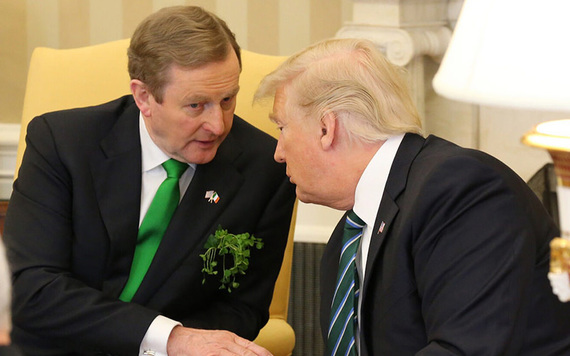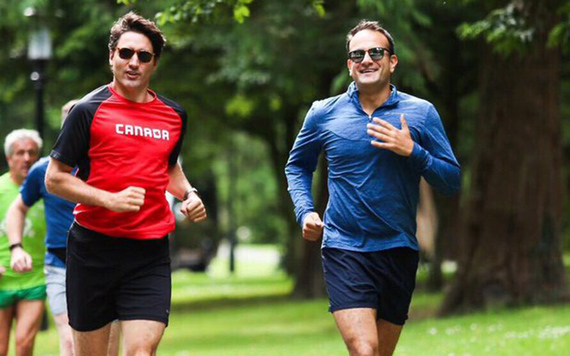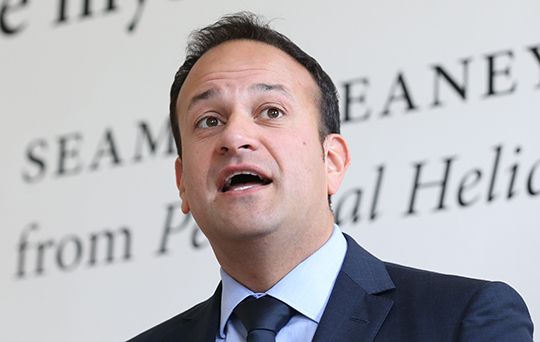New Irish leader Leo Varadkar says he does not want to tell Americans how to govern but that he would be frank with President Donald Trump regarding policies he takes issues with, according to a recent interview with Time Magazine.
The newly appointed Taoiseach (Irish Prime Minister) revealed in a cover interview with the European edition of the magazine that he believes the current US President functions more like a CEO than a politician and that he hopes the friendship between the two countries can be maintained.
In the interview in which he tried to frame Ireland as “the center of the world,” Varadkar recalled an incident when he served as Irish Minister for Tourism and was contacted by Trump, who had a planning issue he wished to solve regarding his Co. Clare golf course.
“I get the impression he is the kind of person who would just pick up the phone and want to ring the man or woman who is in charge over there, rather than necessarily going through normal business or diplomatic procedures,” the new Fine Gael leader told Time in his first in-depth interview with a foreign publication since becoming Taoiseach.
“There are pluses and minuses to that.
“In many ways I actually like that approach, because you know traditional civil service and diplomatic approaches can be all about hierarchies, and sometimes the principals just need to talk and sort it out.
“He is very much a CEO rather than a politician and it might be possible once you have developed a relationship with him to resolve issues that officials and diplomats might spend years exchanging papers on. So I think the first thing is to try to develop a relationship.”
Read more: Leo Varadkar: 5 fast facts you need to know about Ireland’s new leader

President Trump hosting former Taoiseach Enda Kenny for St. Patrick's Day in the White House.
The Dublin-born Varadkar made history when, last month, he was elected as Ireland's youngest leader ever, first openly gay leader and the first from an ethnic minority.
Since his election Varadkar has tried to forge an image of himself as one of the new centrist faces of Europe – along with France’s Emmanuel Macron – who will answer the rise of left and right extremism that some parts of Europe have experienced.
Varadkar, 38, highlighted his view of himself and the government he leads during the recent visit of Canada’s Justin Trudeau.

Justin Trudeau ad Leo Varadkar.
“We maybe side with the right on economic issues, in that we are for balanced budgets and free trade and open market economies,” Varadkar old Time of his new position within Europe.
“Perhaps we are slightly to the left on other issues, such as the role the government has on redistributing wealth, in personal freedoms.
“But then there is a very new division in politics. Those of us who are in the center believe in opening up to the world, believe migration on balance is a good thing if it is managed properly, and believe that multilateralism is the best way to solve problems.”
While looking at Ireland’s closest allies and trading partners on either side of the Atlantic – the UK and the US – and the radical changes in government they are currently going through, Varadkar pitched Ireland as a place that will continue to punch above its weight on a global scale. He used the Apple tax controversy as an example of how the Irish government will be willing to go to bat for those US companies that are looking to invest in operations in Ireland.
“Geographically we are at the periphery of Europe, but I don’t see Ireland in that way,” he said.
“The way I see us is as an island at the center of the world. If you look at things like trade links and aviation links [with Europe and the U.S.], that actually fits in very well with the future of the country. I see us very much at the heart of Europe; we are founding members of the single market, we are founding members of the Euro.
“Notwithstanding what other countries may decide to do – other countries that are turning inwards to a certain extent on themselves — we are absolutely convinced that our place is at the heart of the European home,” Varadkar added, completely rejecting the idea of an Irish vote on its EU membership.
While the 14th Taoiseach admitted that he wished Brexit was not happening and that he still has hopes that the UK will somehow not make a complete exit from the European Union, or at least not make a departure from the single market, Varadkar is confidant that other EU leaders understand the delicate position that the Republic of Ireland is in as the only EU country that will share a physical border with the UK once Brexit finally happens.
“They also understand the thing that is unique when it comes to Ireland, which is Northern Ireland,” he said.
“That is well understood and, in fact, it is very much reflected in the guidelines and the negotiating priorities of the European Union. What I do fully appreciate is that turning goodwill and positive sentiment into a final agreement that can be written down into international law is going to be very difficult, and it still does seem to be largely the position of the British negotiating team that they can retain most of the benefits of membership and disavow most of the costs and responsibilities and that’s not a sustainable position.
“I think we are stronger actually because we are part of a negotiating team with 450 million people behind us. Whereas Britain is negotiating with 60 million people behind them,” Varadkar concluded.
As regards Irish domestic issues, the Taoiseach is faced with the ever-escalating calls for a referendum on abortion, an issue on which he refused to give a definite comment throughout this spring's Fine Gael leadership battle. He has since announced that a referendum will take place next year.
“I think the Irish people should have their say,” he told Time.
“What we need to define over the next couple of months is exactly what question is asked. We have a lot of experience with referendums in Ireland and I think before you ask people the question in a referendum you need to be able to be very clear about what the question they are being asked is. So we want to refine that question over the next six months to a year and put it to the people and allow them to make a decision.”
What are your opinions of Varadkar’s first few weeks of office? What are your predictions for his time as Taoiseach? Let us know your thoughts in the comments section, below.
H/T: Time Magazine




Comments